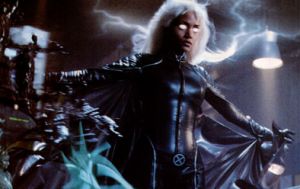Movies /
Comics Movie Reviews
Action Evolved: The Uncanny Story of X-Men on Film
By Troy-Jeffrey Allen
June 11, 2011 - 07:31
 |
| Director Matthew Vaughn, screenwriter Jane Goldman, and producer Bryan Singer learned from past mistakes and turned First Class into...well, first class entertainment. |
The struggle to quality control the
X-Men film franchise has been argued and analyzed by not just fanboys but, also,
by the filmmakers involved. Disrupted by
conflicts of interest and constantly faced with budgetary restraints, the troubles of the 11-years-old
X-Men movie series can easily be typified by the evolution of the films' action sequences.
With 2000's
X-Men,
director Bryan Singer got the keys to the castle without any notable sci-fi credentials. This fact, along with Singer's admission of never growing up with the comic books, added to the grumbling of
X-Men fanboys everywhere.
Despite his lack of experience, Singer got a free pass for keeping with the themes of persecution found in the comics, strongly re-depicting the relationship of Magneto and Xavier, and giving us Hugh Jackman as Wolverine.
Exceptional to comic fans at the time (mind you, all we had at that point was
Blade) X-Men left a lot to be desired in the superhero battles department. With a few small exceptions, the action lacked any true jaw-dropping spectacle and felt uncertain of it's choreography. Particularly, during the film's clunky Ellis Island finale, giving way to
X-Men’s most infamous moment when the then fan-favorite Ray Park dukes it out with the team only to be anti-climatically struck by Halle Berry's leaden acting.
 |
| Little known fact: Joss Whedon wrote the infamous "lightening strikes Toad" scene. (I just broke your little nerd heart, didn't I?) |
Like all film's overly-influenced by
The Matrix (1999),
X-Men doesn't really hold up to repeat viewings. But the groundwork was there for something bigger and with its own distinct voice, which is what we got with
X2: X-Men United.
The newly-minted confidence that Singer displays in the action of
X2 is undeniable after a few seconds into the film's opening sequence.
Still impressive nearly a decade later, Singer introduces the character of Nightcrawler to film audiences with a thrilling game of "now you see me, now you don't" between the teleporting mutie and White House Secret Service.
This entertaining technical display is underlined with a long-awaited berserker barrage by Jackman’s Wolverine character (albeit bloodless), a high-flying aerial escape from the Airforce, and a multi-layered climax inside an exploding dam.
 |
| It's a shame that it took two filmed sacrifices to get X-Men back to the level of quality found in X2: X-Men United. |
X2 gets plenty of high marks for strong character motivations and action that is seemingly free of its predecessor’s budgetary restraints. The sequel is a foot-stomping reminder that sequels are supposed to be bigger and better, which makes
X-Men 3: The Last Stand all the more disappointing.
Rarely are trilogies allowed to creatively thrive without studio interference. Unfortunately, X-Men is no exception.
Disenfranchised by the mandates of
Twentieth Century Fox, director Bryan Singer abandoned the X-Men series (and a potentially super-sweet Dark Phoenix quadrilogy) for what he thought were greener pastures. Fox replaced the promising sci-fi director with action-maker
Bret Ratner.
Now synonymous with filmmaking franchise killer
Joel Schumacher (Batman and Robin), director Ratner came on to an admittedly troubled shoot.
With the one notable exception of a
Wolverine vs. Juggernaut/Xavier vs. Phoenix fight (that had its more satisfying parts left on the cutting room floor), Ratner’s background in action films (
Rush Hour, Rush Hour 2, and
Money Talks) seemed to not help him in the third film.
 |
| You wanted Gambit, fanboy...now you have to suffer for it. |
While Singer wisely set most of his action-set pieces during the night in an effort to mask some of the super-heroic silliness , Ratner showed an over-confidence in his effects and lighting. This resulted in plenty of cheeseball Power Ranger-styled superhero brawls that would plague the X-Men films until
X-Men: First Class (don’t even get us started on
X-Men Origins: Wolverine).
No stranger to effects films (
Stardust), action films (
Layer Cake) or superheroes (
Kick-Ass),
Matthew Vaughn walked into
X-Men: First Class with a very advantageous position. Despite a rushed production, the director was able to look at the mistakes made by Singer, Ratner, and (
X-Men Origins: Wolverine) Gavin Hood and side-step them.
Against all odds, Vaughn creates an action set-piece that is 60s-retro, emotionally charged and, by far, the most grandiose in the franchise’s decade-long history.
***SPOILER ALERT***
Like all smart action filmmakers should know, a big finale is not just an excuse to dump the bulk of your effects budget but it is also meant to link all the character drama that has built up to this moment.
 |
| Halfway through X-Men: First Class, even I was still skeptic. The power of that finale won me over though. |
Vaughn does exactly that by letting the philosophical debate between Professor Xavier (James MacAvoy) and Magneto (Michael Fassbender) come to a head during the film’s Cuban Missile Crisis climax. While the Malcolm and Martin of mutants follow their arcs to their bittersweet conclusion, the issues of identity that inform the characters of Mystique (Jennifer Lawrence) and Beast (Nicholas Hoult) successfully run alongside it.
With Vaughn at the helm (who was originally supposed to direct
X-Men 3), Jane Goldman assembling several scripts into one cohesive whole, and Bryan Singer stepping back and taking producer credit, the
X-Men series is finally given the TLC that seemed to be in blossom during
X2.
While Singer wisely seemed to embrace the thematic and sci-fi aspects of the source material, Vaughn gives the film a confident 007-swagger. Most notably, he tackles the concept of super-powered flight while Singer was vocal about never being comfortable with it.
In a genre of film that threatens to get old but shows no signs of stopping, Vaughn and Goldman’s confidence is much needed. Much like Singer’s 2000 opening curtain,
X-Men: First Class --- with its enlarged spectacle and engrossing revenge elements --- makes this era of comic book movie seem fresh and exciting.
We didn’t think we could say this again, but...we can’t wait for the next one.
 |
| Epic! |
Last Updated: January 17, 2025 - 08:20





